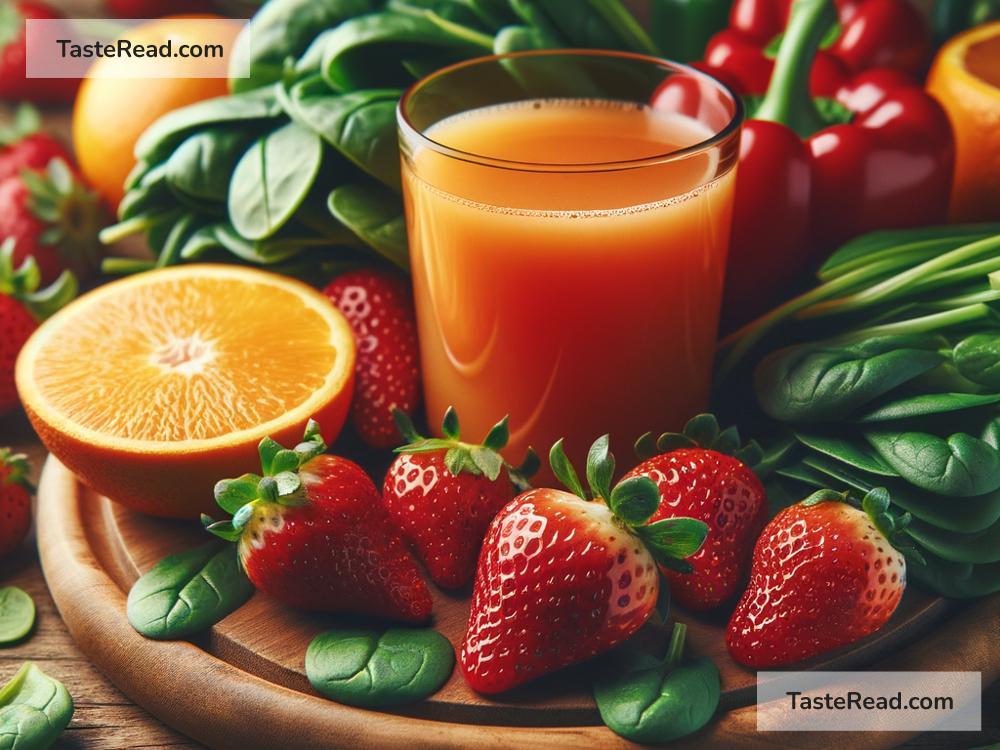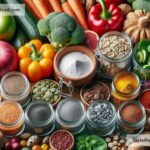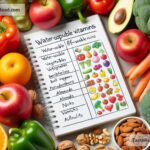Understanding the Role of Water-Soluble Vitamins
Vitamins are an essential part of maintaining a healthy body. These tiny but mighty nutrients help our bodies perform important tasks, such as turning food into energy, repairing cells, fighting off illnesses, and more. Vitamins come in two types: fat-soluble and water-soluble. Today, let’s focus on water-soluble vitamins—a group of nutrients that play a huge role in keeping us healthy.
What Are Water-Soluble Vitamins?
Water-soluble vitamins dissolve easily in water. Unlike fat-soluble vitamins, which are stored in our body’s fat tissues, water-soluble vitamins aren’t stored for long periods. Instead, they’re absorbed into the bloodstream and used right away. Any excess water-soluble vitamins leave the body through urine, which is why we need a constant supply of these vitamins from our diet.
There are two main groups of water-soluble vitamins:
1. Vitamin C (also called ascorbic acid)
2. B vitamins, which include:
– B1 (Thiamine)
– B2 (Riboflavin)
– B3 (Niacin)
– B5 (Pantothenic acid)
– B6 (Pyridoxine)
– B7 (Biotin)
– B9 (Folate or folic acid)
– B12 (Cobalamin)
Each of these vitamins has unique duties in our body, but they work together to keep everything running smoothly.
Why Are Water-Soluble Vitamins Important?
Water-soluble vitamins may be small, but they’re vital for many bodily functions. Here’s how some of these vitamins help us:
-
Vitamin C: Known as an immune-boosting superstar, vitamin C helps protect the body from infections and illnesses. It also supports healthy skin, boosts collagen production for wound healing, and strengthens blood vessels. On top of that, vitamin C is an antioxidant, meaning it helps fight harmful molecules called free radicals that can damage our cells and speed up aging.
-
Vitamin B1 (Thiamine): Thiamine is often called the “energy vitamin” because it helps turn food into energy that the body can use. It’s also needed for healthy brain function and the nervous system.
-
Vitamin B2 (Riboflavin): Riboflavin is involved in energy production and helps the body break down proteins, fats, and carbohydrates. It also supports healthy skin, eyes, and red blood cells.
-
Vitamin B3 (Niacin): Niacin helps maintain healthy skin, digestion, and the nervous system. It also plays a role in turning food into energy and has been linked to lowering cholesterol levels.
-
Vitamin B5 (Pantothenic Acid): This vitamin helps produce hormones and supports the creation of red blood cells. It also assists in energy production.
-
Vitamin B6 (Pyridoxine): Pyridoxine is crucial for brain development and supports the body’s immune system. It also helps produce neurotransmitters—chemical messengers in our nervous system.
-
Vitamin B7 (Biotin): Biotin is often praised for promoting healthy hair, skin, and nails. But it also helps our body metabolize fats, proteins, and carbohydrates.
-
Vitamin B9 (Folate or Folic Acid): Folate is especially important during pregnancy, as it helps form healthy cells and prevents birth defects in the baby’s brain and spine. It also supports red blood cell production, DNA formation, and tissue growth.
-
Vitamin B12 (Cobalamin): This vitamin helps produce red blood cells, supports the nervous system, and keeps our DNA healthy. It also plays a key role in preventing anemia—a condition where the body doesn’t have enough oxygen-carrying red blood cells.
Where Can You Find Water-Soluble Vitamins?
You don’t need fancy supplements to get enough water-soluble vitamins. Many of these nutrients are found in common foods you can easily add to your daily meals. Here are some examples:
- Vitamin C: Citrus fruits (oranges, lemons, grapefruits), strawberries, kiwis, bell peppers, and broccoli.
- Vitamin B1: Whole grains, nuts, seeds, pork, and legumes.
- Vitamin B2: Dairy products like milk and yogurt, eggs, leafy greens, and lean meats.
- Vitamin B3: Chicken, fish, peanuts, mushrooms, and whole grains.
- Vitamin B5: Eggs, mushrooms, avocados, sunflower seeds, and poultry.
- Vitamin B6: Potatoes, bananas, spinach, fish, and fortified cereals.
- Vitamin B7: Eggs, nuts, seeds, and sweet potatoes.
- Vitamin B9: Dark leafy greens, beans, lentils, oranges, and fortified grains.
- Vitamin B12: Meat, fish, dairy products, and fortified cereals. (Vegetarians and vegans may consider taking supplements since B12 is mainly found in animal products.)
Can You Have Too Much or Too Little?
Getting the right balance of water-soluble vitamins is important. Too little can lead to deficiencies and health problems. For example:
– Lack of vitamin C can cause scurvy, leading to fatigue, swollen gums, and bruising.
– A deficiency in B12 can cause anemia, weakness, and nerve problems.
– Too little folate during pregnancy increases the risk of birth defects.
On the other hand, excessive intake from supplements may lead to side effects like stomach upset or nerve damage. While it’s hard to overdose on vitamins from food alone, it’s wise not to go overboard on supplements without consulting a doctor.
Final Thoughts
Water-soluble vitamins might not stay in your body for long, but they’re essential for staying healthy and energetic. The best way to get enough of them is by eating a balanced diet full of fresh fruits, vegetables, whole grains, lean proteins, and dairy products. By including a variety of foods in your meals, you can ensure your body gets everything it needs to thrive.
Remember, your body is like a machine, and vitamins are the tools that keep it running smoothly. So, eat well, stay hydrated, and let water-soluble vitamins do their job!


